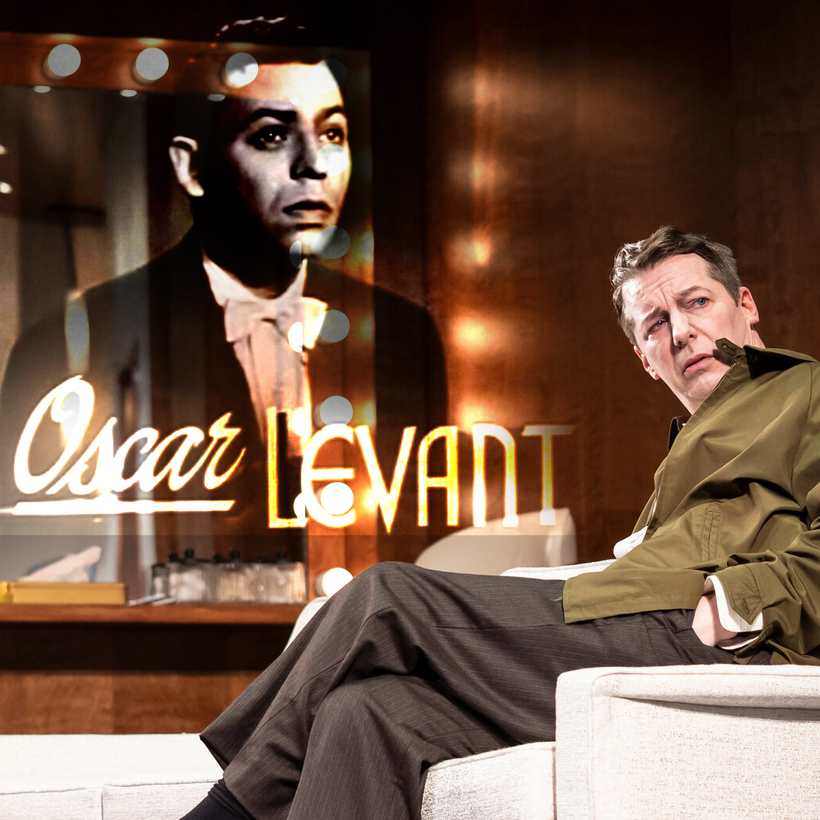Remember raconteurs? Of course you don’t. They were way before your time, ducklings. Accomplished storytellers of a droll, urbane bent, they represented a rarefied breed of armchair entertainer now as extinct as burlesque artists. Yet once upon a time in broadcast land, when rabbit-ear antennas sprouted across wholesome American living rooms, raconteurs glided the airwaves, toning up quiz programs and late-night talk shows with gem-cut witticisms and perfectly baked anecdotes.
No venue was more hospitable to the higher gab than the Tonight show, then hosted by the mercurial Jack Paar. Peter Ustinov, Alexander King, Jack Douglas, the singer Genevieve, Beatrice Lillie, Orson Bean, these were among the all-star semi-regulars. But the guest who stood out most, then and now, was Oscar Levant, a shambling train wreck of a legend who could bring down the house with one croaky wisecrack. He turned raconteurship into offhand psychodrama.

A gifted pianist who wrote hit songs, composed film music, conducted orchestras, and recorded the music of his friend George Gershwin, Levant is perhaps most famous for his sidekick roles in the movie musicals An American in Paris and The Band Wagon, where his lack of ability to sing and dance proved no impediment; he gave it all he had, and that, plus his antic presence, was plenty enough.
It wasn’t Levant’s tales of Hollywood lore, however, that proved such a revelation on the Tonight show. Famous one-liners such as “I knew Doris Day before she was a virgin” were only appetizers. It was Levant’s frank, rueful testimony to the ravages of anxiety, depression, and institutionalization that resounded, subjects seldom broached in the late 1950s outside of psychiatric journals and plays by Tennessee Williams.
After a heart attack in 1950, Levant had become addicted to the painkiller Demerol, and his long downward spiral commenced. Some of his experiences he rolled into a punch line, such as his claim that he was asked to leave the sanitarium for depressing the other patients, but others he expressed with a wistful poignancy: “You know, when you’re suffering from deep depression, you cannot make a decision. I first had deep apathy, then relapsed into deep depression. Gee, how I long for those deep apathy days.”

Oscar Levant’s struggle with the noonday demon is being improbably brought to life on Broadway this April in Doug Wright’s Good Night, Oscar, a play with music based on Levant’s revelatory appearance with Jack Paar in 1958, and starring Sean Hayes as Oscar (with Ben Rappaport as Paar). Why improbable? Because Levant and Sean Hayes couldn’t seem more dissimilar. Where Oscar was rumpled, out of shape, froggy, his face beset by as many tics, blinks, and twitches as Dr. Johnson’s, Hayes, best known for his jumping bean Jack McFarland on the sitcom Will & Grace, is slim, spry, smooth, and hyperkinetic.
But interpretation goes deeper than impersonation. This is clearly a passion project for the explosively talented Hayes, and the reviews out of Chicago, where the play premiered, were rapturous—so who are we to cast doubt? Good Night, Oscar may well be the wayward bolt of brainy energy Broadway badly needs.
Good Night, Oscar is on at the Belasco Theatre, in New York City, through August 27
James Wolcott is a Columnist for AIR MAIL. He is the author of several books, including the memoir Lucking Out: My Life Getting Down and Semi-Dirty in the Seventies and Critical Mass, a collection of his essays and reviews

